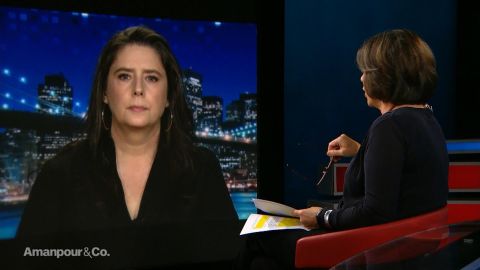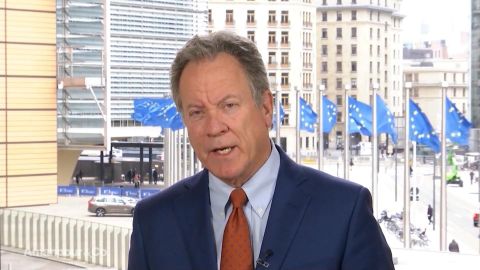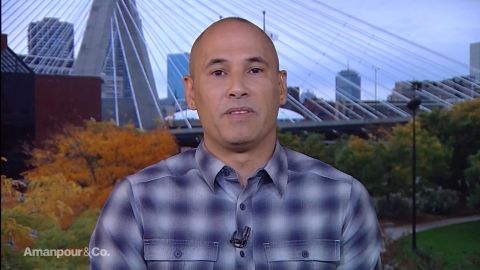Read Transcript EXPAND
Highlighting the political tribalism affecting the United States, from Charlottesville to Charleston to Pittsburgh, the FBI confirms that racism and anti-Semitism are on the rise.
The latest numbers show that hate crimes were up 17 percent in 2017 from the previous year. The investigative site Pro Publica and FRONTLINE have just released a new investigation into white supremacist groups in the United States, in particular a neo nazi group that has actively recruited inside the U.S. military.
A.C. Thompson reports for Pro Publica and contributes to FRONTLINE.
He spoke to our Hari Sreenivasan about this.
A.C., this is the second in a series of films that FRONTLINE is publishing documenting hate.
Tell us a little bit about the scope of this project.
Now basically back at the end of 2016 we started building a coalition of newsrooms that were going to report on hate crimes acts, of bias and bigotry, and track the resurgent white power movement. So that's what we've been doing since then with newsrooms across the country, about 160 different organizations.
The documentaries are sort of one of the most high profile products that we've put out in that series, but they're part of a broader series.
Last year you took a look at Charlottesville and what happened there.
Let's take a listen and look to that clip from that documentary.
'Charlottesville, Virginia.
August 12, 2017.
I've been tracking hate crime since the 2016 presidential election and I could see that something was happening in this country.
The Charlottesville rally was supposed to be about a Confederate monument, but anyone who was paying attention could see that it was about more than a single statue.
It felt like a national reckoning around race was coming and being here would help me understand it.
As the day unraveled into chaos around me, one thing became clear.
This was not a place to listen or understand.
Charlottesville was a crime scene.'
A.C., one of the questions that comes up after watching that documentary is that how was this not something that law enforcement saw and was prepared for and had policies surrounding?
You know, that's a that's a great question and honestly it's one in our reporting that we still haven't answered.
What we know going into Charlottesville is that the local police and the Virginia state police there had warnings that there could be violence and that people would be bringing implements of violence, clubs, knives, pepper spray, helmets, shields, and I think the sort of central failing there is that they prevented people from, they didn't prevent people, they allowed people to bring those weapons and they didn't stop them from bringing them. I think that was really the key thing and that was a pattern that we saw all that year throughout 2017, that different police forces were sort of failing to do that, they were failing to intervene in a smart way when they had these obvious conflicts that were going to happen.
Right, since then, as you mentioned the documentary is just one of the high profile things, you have been continuing to report on this, you've been publishing about this and we're going to take a listen to a clip from this year's documentary about some of the consequences since then. Take a look.
'After Charlottesville, I identified some of the groups behind the violence.
With a team of reporters, I exposed a neo nazi fight club called The Rise Above movement or R.A.M.
They were involved in melees in four different cities.
Following our investigation, eight members or associates of R.A.M.
are now facing federal charges, but the most extreme organization I've been looking at is called the Atomwaffen Division.
Atomwaffen means atomic weapons in German.
The group embraces Nazi ideology and preaches a hatred of minorities, gays and Jews.
It calls for lone wolf acts of violence, much like the massacre in Pittsburgh.'
You mention in this film that there's actually not that many of them to start with. Perhaps they're growing in numbers.
How big are they? Give us a sense.
Well what we know is that after Charlottesville the group recruited a lot of new members.
People were saying hey you know we wanted to have a public white power rally, it didn't go over, all this you know chaos ensued, so the way to move forward is to go underground, is to become a guerrilla violent organization.
A lot of people signed up with Atomwaffen after that and went in that direction.
We know that after Charlottesville the group had between 60 and 80 members, but the thing about them that's important is that they're an extreme group.
They're an incredibly violent group.
Their entire ideology is based on lone wolf terrorism, political assassination, random acts of violence and so when you have a group like that, it doesn't matter if they have six members or 60, they have the capacity to do serious harm.
And you get all this from interviews with people who are in the organization, you're looking at chat logs of what they're talking about and when.
You point out that they're recruiting in active duty military and in veterans. Why?
You know this is a strategy that the white power movement has been using for decades.
Basically after the Vietnam War, the white power movement refashioned itself as a paramilitary movement.
It sort of took former soldiers and emulated the tactics of the U.S. military, it said look we're not just going to prop up white supremacy, we're going to overthrow the government and usher in a new white government, a new fascist government.
And so what you see now with the current iteration of the white supremacist movement, they're taking those tactics, they're recruiting former soldiers, former Marines, former airmen and they say we want your skills, your knowledge of weapons, your combat training and your ability to blend into society and our aim is to engage in acts of violence and terrorism and eventually guerrilla war.
You even found active duty military members who were part of Atomwaffen.
What's the military doing about this?
You know that's a big question that we've been trying to answer.
Basically, there is not in the military justice code, there's no actual specific code that deals with being a member of an extremist group, so it's hard to track right.
It's like there's nothing in the military penal code basically on this, but we know that members are barred from joining these groups.
So what we've learned is in the last five years, the Pentagon is saying there have been 27 reports of extremist activities in the ranks across all branches.
In five years?
In five years. Experts we're speaking to say that is a very very low number and they're not sure that that is an accurate number.
So when you talk about this, the way that you mention basically lone wolf terrorism, the organization of it in almost these little cells, there is parallels here to any kind of terrorism that we are familiar with since 9/11.
It's just a different group of people.
Exactly and that's an important important thing to know is that this is a movement that long ago said, hey we're not going to form massive, top down terrorist organizations, we're going to operate in ones and twos and threes with people who know each other and that way we won't be infiltrated by the feds and we won't be taken down.
So when you see an act like what happened at the Tree of Life Synagogue, Robert Bowers the alleged shooter, he is coming out of a white power movement that encourages people to engage in those type of attacks to advance its agenda and that is a thing that I think people are missing.
What's our government response been to this? I mean, are we devoting enough resources, have we diverted resources from these type of extremist groups?
You know all of our reporting suggests that basically two things happened around 2009.
The threat started ticking up at that point because a lot of people in the movement were angry that we had our first African-American president and at the same time, the Obama administration sort of deemphasized white supremacist groups and domestic terror antigovernment groups at that time and really funneled resources towards other types of terrorism.
So I think what we've seen over the last 10 years is a gradual and increasing turning away from these kind of threats and I think at this point we're not particularly well prepared to deal with them.
I mean here we are a year after Charlottesville and you're telling me we're still not prepared.
I mean there was a story recently about a police officer in Gainesville, Florida, trying to prepare and he was saying I don't have a dossier from Department of Homeland Security, the federal and the state and local agencies don't have enough information on what's in my own backyard.
Yeah I mean I definitely have seen some federal intelligence reports that make me think there are definitely some analysts and some agents that have a handle on what's going on, but I also think the broader picture is worrisome and I think when we look at particularly what's going on with the military, which is a thing that we need to focus on with these groups, I don't think that there has been a strong response.
So for example the military, to my knowledge does not have a tattoo database to see whether people have white supremacist or gang tattoos and that is a problem.
That's one way that people mark themselves in one way you can track them.
Another problem that you see is they don't really monitor people's social media when they're being recruited, so we've encountered white supremacist who are open about their Nazi views and then joined the military and they're posting this stuff on Facebook, Instagram, Twitter.
If you just did a cursory search you could keep these people out of the service.
All right, you are focusing on a specific group and a specific movement but put this in the context of the times. Just recently we had new hate crimes reporting data that was released and it's up.
Right, so the first thing to understand is that we are still down from historic highs that happened after 9/11, so that is a good thing and we should feel good about that.
However, we should be very concerned because we have several years of increasing hate crimes numbers, I think going back to about 2014.
I think they've gone up since then every year up to 2017, which the most current data.
So that should be a concern for us.
That should be something that we should be worrying about and we should be tracking and that I think is the broader context that we see these organized groups acting in.
You spoke to James Mason who's kind of a spiritual leader for the folks that are part of Atomwaffen.
He is somebody who considers Timothy McVeigh a hero.
You know, he, what was interesting in the conversation that you had was he sees sort of upside potential in the Trump administration and this presidency.
Why?
Yeah that shocked us that shocked us because James Mason has always been a guy who said hey we have to tear down the U.S. government and impose our white fascist regime. He was always about destroying the government and we thought that that's what he was going to say to us.
Instead what he said is oh you know I still support guys like Tim McVeigh or James Fields who allegedly drove the car into the crowd in Charlottesville but I also love Trump and there's no telling what he might do and I finally have hope that some of my fascist goals will finally be realized, so that was pretty shocking to me.
Tell me a little bit just the reporting process.
There's a scene where you go to a death metal concert in Dallas and, as a reporter, I'm sitting there going well better him than me, but here you are, you know you've got no hair on your head, you got huge tats on your arm and you're able to walk in and blend in. Do you think that in some ways, that helped you at least approach these people?
Yeah you know in that case we wanted to get inside the scene and we had a tip that members of the Atomwaffen group would be at this underground metal show and since I was coming in with a camera crew I figured hey I might as well try to not be totally extra obvious, so I actually get a chance to talk to them, but you know that thing for me that I think can be useful at times is that I followed the skinhead movements and the neo Nazi movements in the 80s and 90s and there's definitely a connection from those movements and also the way that they connect to subcultures like the punk subculture, the metal subculture and I sort of know that stuff and I think it's useful for me and my reporting now.
Is there a difference, considering that you have been covering this beat for so long, is there something different that you're noticing in these groups today that perhaps you didn't see in the 80s and 90s?
Yeah, absolutely.
I mean the first thing is that a lot of these people are much more connected to the mainstream of society, right, so if you look at the earlier groups they were much more outside the sort of center of society, they were disconnected from the main cultural current.
They couldn't watch Hollywood movies because they believed that Hollywood was controlled by degenerate Jews.
They couldn't watch sports because there were too many people of color playing sports.
They could not relate to average people.
With the current movement, it's very young.
I think a lot of these people are very smart.
I think they're incredibly adept at moving their way through the internet and social media.
Now, these organizations are taking advantage of the biggest social media platforms out there and they're able to build an audience and connect with potential followers using those platforms.
It's a remarkable change and that's really allowed them to proselytize and spread their message in a way that was never possible before.
What's been the personal consequence of this reporting?
You know here's the thing, anybody that's doing this work in this space has to worry about repercussions whether they're online or in the real world and I'm not immune to that.
I think all of my colleagues that are working doing this kind of reporting have had bad incidents and sometimes really scary incidents, but I also think that that's part of a broader pattern that we're seeing where when people are expressing themselves in public forums, whether it's on Twitter, whether it's on Facebook, whether it's on YouTube, they're encountering a wave of harassment, particularly if they're people of color, religious minorities, or so forth and I think you know what we're experiencing as reporters is just part of the broader sort of situation.
All right A.C. Thompson of Pro Publica and a correspondent for FRONTLINE.
Thanks so much.
Hey thank you.
About This Episode EXPAND
Christiane Amanpour speaks with David Beasley, Executive Director of the World Food Programme; Yemeni human rights activist Radhya Almutawakel; and Blair Foster, director of the docuseries “The Clinton Affair.” Hari Sreenivasan speaks with investigative reporter A.C. Thompson.
LEARN MORE



